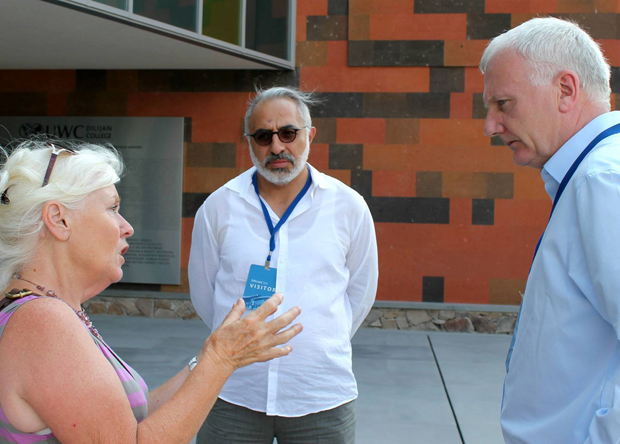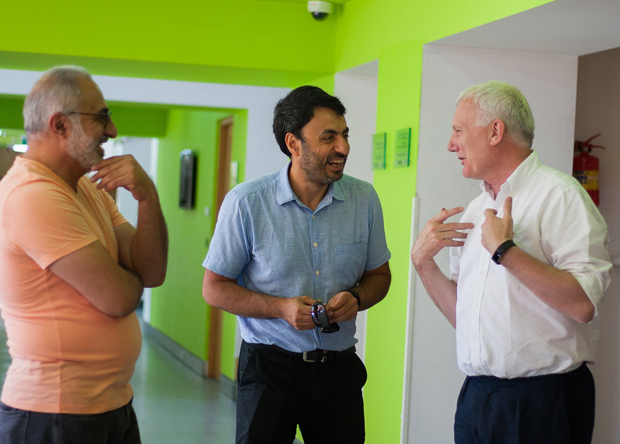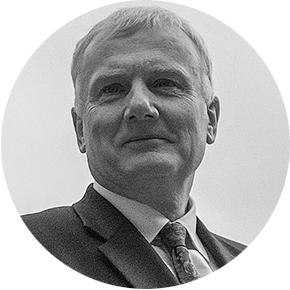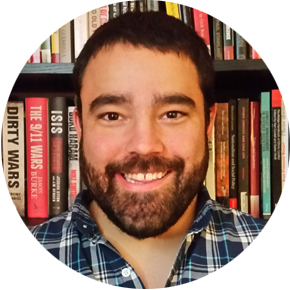At the invitation of the Ayb Educational Foundation, Patrick Derham, the Head Master of Westminster School, visited Armenia.
The visit has been organized within the framework of the rollout of the Araratian Baccalaureate educational program to schools in Armenia, for the purpose of establishing cooperation and exchange of practice. While in Armenia Patrick Derham visited Ayb School, as well as UWC Dilijan College, Dilijan Central School, Tumo Center for Creative Technologies and American University of Armenia to get acquainted with the innovative projects and reforms carried out in Armenia’s education sector.
Mediamax talked to Patrick Derham.
- These were the best 6 days I have ever experienced. My visit exceeded my expectations. It was an absolute pleasure to meet all those amazing people and see the extraordinary history, culture and heritage. It’s my first visit, but it will not be the last one.
One of the two things I won't forget ever is the visit to the Armenian Genocide museum. It was deeply moving. The other one was talking to people - all of them had stories to tell. I am looking forward to my next visit.

Photo: Ayb Foundation
I was particularly interested in what Ayb School is doing with “Araratian Baccalaureate”, which is very impressive. The fact that it's been done in partnership with the University of Cambridge is a huge initiative and I think it is perfect for Armenians who benefit from it, in terms of not just rooting them to their Armenian culture but also making them globally aware. I am very impressed with what I've seen. I don't know so much about what's happening in other schools of Armenia, I’ll research more during my next visit.
The thing that impressed me a lot in Armenia are people. There is no doubt that the greatest resource of Armenia is the human capital. The identity that comes from culture, church, an understanding on what the country has gone through over centuries. And it is very important for Armenia to hold on that.
- Do you have any Armenians teaching or studying in Westminster school?
- We don’t have any Armenians teaching at school, but we have a boy from Armenia coming to our school in September. It’s exciting. We had Armenians in the past, but they were mainly from Diaspora.
- Do you have any suggestions on how to improve the educational systems?
- It’s one of the toughest questions facing all of us across the world. It’s about how you improve the state education and the public education and there is no simple solution to that. If anybody had that solution we'd all be benefiting from it, but the key thing and probably the only thing that educational experts agree on is that the quality of the teacher makes the difference.
That interaction between teacher and pupils in the classroom is an important thing. And for all of us wherever we are in the world the solution is to find the best teachers, making sure that they recognize that education is a lifelong learning process and that there is always space for improvement.
You've got to work very hard at retaining best teachers. The problems of workload and salary are crucial. You have to make sure that teachers are paid enough. There is not a better job than working with young people and setting them on the lifelong road of learning. I've been blessed with my career with over thirty years of working with young people, who are now making a difference in the world.
- Technology nowadays has a huge role in classrooms. What changes do you see in interaction between teachers and pupils?
- When used properly, technology can be very helpful, but it can't replace the teacher. The best examples of teaching are those who incorporate the use of the technology.
Education is hard work, to learn things you have to think. Thinking is challenging, but it’s rewarding and providing young people with that kind of skills is important.

Photo: Ayb Foundation
Technology can help but the crucial thing is to be sure that young people are taught how to recognize bias. Just because Wikipedia is number 1 in Google search doesn't necessarily mean it contains right information and that young people have to check bias and work very hard at identifying, weighing up the evidence to come to their own informed opinion. And that's actually what education is about. It's developing that questioning tradition - asking the right questions and learning to think.
- Do you think that platforms like Coursera, edX can replace traditional classrooms?
- Anything is possible. And if we would be having this conversation 20-30 years later, we might have a clear answer. In this moment, I don't know. Online learning is a very interesting opportunity, it's ensuring that every member of society has access to it.
The new generation is living through extraordinary change. The world is a very different place where young people are going to change many times. And they have to have that skillset, flexibility, the resilience to cope - those are important things in school. And I'm not sure you can obtain those skills in online format.
The best schools nowadays are bracing technology. The best educational systems are combining traditions with modernity. It has to be a healthy mix. You can’t stop innovating, you have to be constantly looking at ways in which you can improve.
The artificial intelligence for example will be getting the most interesting developments in the next few years for education. We live in a really exciting time.
Narine Daneghyan talked to Patrick Derham



























Comments
Dear visitors, You can place your opinion on the material using your Facebook account. Please, be polite and follow our simple rules: you are not allowed to make off - topic comments, place advertisements, use abusive and filthy language. The editorial staff reserves the right to moderate and delete comments in case of breach of the rules.